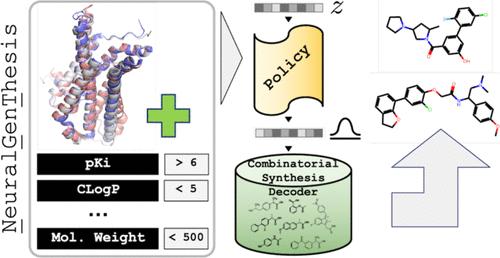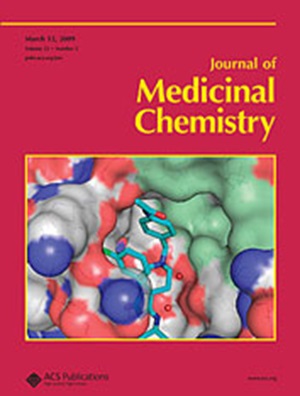NGT:具有可合成性保证的生成式人工智能从大规模虚拟筛选中发现 MC2R 抑制剂
IF 6.8
1区 医学
Q1 CHEMISTRY, MEDICINAL
引用次数: 0
摘要
商业化的按需合成虚拟库包含多达数万亿个可随时合成的化合物,用于药物发现活动。这些文库是进行快速硅学发现、性质优化和体外验证的重要资源。然而,随着这些库的规模不断呈指数级增长,传统的搜索策略遇到了很大的局限性。在此,我们介绍一种高效的强化学习方法 NeuralGenThesis (NGT),用于从超大型化合物库中生成满足用户指定约束条件的化合物。我们的方法首先在虚拟库上训练一个生成模型,然后训练一个归一化流程,学习潜空间的分布,从而解码出满足约束条件的化合物。NGT 允许同时使用多个约束条件,而不会影响分子特性的计算。利用 NGT,我们从三万亿个化合物库中生成了对黑皮质素-2 受体(MC2R)有效的选择性抑制剂。NGT 为浏览超大型虚拟化合物库提供了一个功能强大、可扩展的解决方案,从而加快了药物发现工作。本文章由计算机程序翻译,如有差异,请以英文原文为准。

NGT: Generative AI with Synthesizability Guarantees Discovers MC2R Inhibitors from a Tera-Scale Virtual Screen
Commercially available, synthesis-on-demand virtual libraries contain upward of trillions of readily synthesizable compounds for drug discovery campaigns. These libraries are a critical resource for rapid cycles of in silico discovery, property optimization and in vitro validation. However, as these libraries continue to grow exponentially in size, traditional search strategies encounter significant limitations. Here we present NeuralGenThesis (NGT), an efficient reinforcement learning approach to generate compounds from ultralarge libraries that satisfy user-specified constraints. Our method first trains a generative model over a virtual library and subsequently trains a normalizing flow to learn a distribution over latent space that decodes constraint-satisfying compounds. NGT allows multiple constraints simultaneously without dictating how molecular properties are calculated. Using NGT, we generated potent and selective inhibitors for the melanocortin-2 receptor (MC2R) from a three trillion compound library. NGT offers a powerful and scalable solution for navigating ultralarge virtual libraries, accelerating drug discovery efforts.
求助全文
通过发布文献求助,成功后即可免费获取论文全文。
去求助
来源期刊

Journal of Medicinal Chemistry
医学-医药化学
CiteScore
4.00
自引率
11.00%
发文量
804
审稿时长
1.9 months
期刊介绍:
The Journal of Medicinal Chemistry is a prestigious biweekly peer-reviewed publication that focuses on the multifaceted field of medicinal chemistry. Since its inception in 1959 as the Journal of Medicinal and Pharmaceutical Chemistry, it has evolved to become a cornerstone in the dissemination of research findings related to the design, synthesis, and development of therapeutic agents.
The Journal of Medicinal Chemistry is recognized for its significant impact in the scientific community, as evidenced by its 2022 impact factor of 7.3. This metric reflects the journal's influence and the importance of its content in shaping the future of drug discovery and development. The journal serves as a vital resource for chemists, pharmacologists, and other researchers interested in the molecular mechanisms of drug action and the optimization of therapeutic compounds.
 求助内容:
求助内容: 应助结果提醒方式:
应助结果提醒方式:


